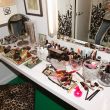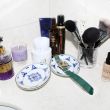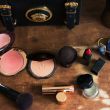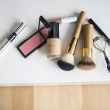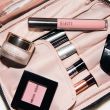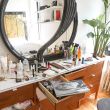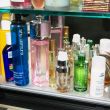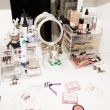By all accounts, my morning routine takes very little time. A coat of mascara, a layer of La Roche-Posay tinted sunscreen, and a swipe of Josie Maran’s Argan Color Stick on my cheeks and I’m out the door. It's so simple—the bare minimum, really—that it absolutely baffles me that it still takes me three times as long to get ready in the morning as my boyfriend (who, I might add, also spends a lot less time staring into the closet to choose an outfit, since he wears a suit every day).
It turns out, there’s a name for this: the “makeup tax.” It’s the idea that women, in order to look “presentable” before walking out into the world, have to spend extra time, money, and effort. In a recent piece on the “makeup tax” in The Atlantic, Olga Khazan cites some startling statistics: The average woman will spend $15,000 on cosmetics in her lifetime and two weeks per year putting on makeup.
Now, that's not necessarily a problem. If you love beauty, you love it—and you're willing to spend endless time and money on it. Sometimes a Tom Ford lipstick is just the thing. (This is to say nothing of how it's marketed towards women almost exclusively and therefore an assumed part of a female routine.) However, it does become a problem if you're punished for not wanting to take the time. One study showed that women who wore makeup appeared more competent and likable (women who wore too much makeup, on the other hand, seemed less trustworthy). Another study suggested that women who wore makeup got more prestigious jobs than those who didn’t. Khazan likens going barefaced to someone who shows up to a work meeting with a stained shirt—it’s perceived as sloppy.
The solution here is obviously not for all women to stop wearing makeup. Nor do I think we should all work from home so that we can hide our bare faces in shame. Going without makeup, for anyone who's acquainted with a serious skincare routine, is certainly not sloppy. Regardless, it seems this is just another tightrope women have had to walk and continue to navigate in order to find certain kinds of professional success (speak loud, but not in a whiny tone of voice; spread out, but don’t take up too much space; tap into your masculinity, but don’t give up your femininity; and so on).
I don’t want to add specific rules about makeup to that ever-growing list of ingredients women need to succeed. So here’s another idea: Maybe the reason women get ahead when they're more made-up has more to do with confidence. I’m not sure that my tinted sunscreen, blush, and mascara make a huge difference in what I look like—but it feels huge. Not wearing makeup, for me, is sort of like forgetting to brush my teeth: it’s just weird. But if I carried myself with the same confidence barefaced as I did with makeup on, would anyone even notice the difference? I’m not sure. What I do know is that if I had an extra $15,000 and two weeks each year, I’d take a vacation somewhere tropical and warm. No makeup allowed.
But that's just me. And the great thing about my feelings is that they only apply to my life—so what about yours? Does your makeup tax you at all? Maybe it doesn't. Either way, I'm curious to know.
—Arielle Pardes
Photos via ITG.
Tax or no tax, how long does it take you to get ready in the morning?









